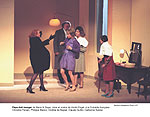
 |
|
|

 Bakary Sangaré rehearsing “Papa doit manger” © LOT/COURTESY OF LA COMEDIE FRANCAISE |
Drama out of Africa
by Molly Grogan From dead-beat dads to Œdipus A revolution has been taking place this season at that temple of Gallic culture, the Comédie-Française. Last September, the Maison de Molière elected — for the first time ever — a black actor, the Malian Bakary Sangaré, to become a sociétaire or member of the company. This landmark event was equaled in February when a play by a female author, the 36-year-old Franco-Senegalese writer Marie NDiaye, entered the repertoire: “Papa doit manger” is the first piece by a contemporary author to be admitted in 20 years and the first play ever by a woman. Under the direction of Marcel Bozonnet, a welcome rejuvenation has begun of the very spirit of the 328-year-old “Comédie,” better known for full regalia productions of “Tartuffe” than lean and daring modern writing. If ignored until now by French theater’s holy of holies, Africa has made its presence felt on other stages, thanks notably to Peter Brook, who has long cast actors like Sangaré and his countryman Sotigui Kouyaté in shows like “The Mahabharata” and “The Tempest.” Just coincidence perhaps but the themes treated in “Papa doit manger,” which plays on patria (family) as both father and fatherland, are reflected in “Œdipe ou la controverse,” which Kouyaté directs this month in an African reading of the Greek tragedy. The two events offer an opportunity to examine the complex fabric of racial relations in a “black-blanc-beur” France. Africa’s arrival in the hallowed halls of the Salle Richelieu touches on irony: it was on the urging of Louis XIII’s “principal ministre” that France began establishing military bases and trading posts in Africa, the Caribbean and Madagascar, thus embarking on four long centuries of colonial imperialism. Seemingly true to the cardinal’s 17th century ethnocentrism, previous administrators of the Comédie-Française had resisted calls to engage actors of color, claiming that the company’s repertoire offered them too few roles. Bozonnet, who took over the theater’s direction this season, feels otherwise having pushed personally for Sangaré’s admission, he insists that no color-typing will take place in casting decisions. If Bozonnet’s promise holds true (in his first role, Sangaré plays an African), the house made famous by Molière is indeed turning a new page in its existence with “Papa doit manger.” Not only does NDiaye's piece star Sangaré as the deadbeat dad come back after a 10 year absence to demand his due from a family who has completely forgotten him, but it also examines in allegorical terms the dilemma of Franco-African relations some 40 years after decolonization. Papa’s mix of seductive charm and “insurpassable” blackness act like a potent gris-gris on his French wife and outraged in-laws, reigniting passion in the former and inspiring guilt in the latter. A fast-talking hustler, Papa nevertheless isn’t quick enough on his feet to free himself from himself as seen through the eyes of others: i.e. as a black man. His wife and children finally give him his walking papers for fear of being saddled with the victim that Papa plays to perfection. As NDiaye hints however, the Africa that France created — dependent on the former colonial power for legitimacy in a world where money alone talks — will not be so easily dismissed. In its study of duty in the context of both family and international relations, “Papa doit manger” raises also the question of what might make those obligations easier to meet: forgiveness. The theme is dear to Sotigui Kouyaté who — as a griot, or member of a family of oral historians and royal councilors dating back to the Manding empire in 13th century Mali — is well versed in the value, on both political and human levels, of pardoning one’s adversaries. After “Antigone” with Bamako’s Mandéka Théâtre in 1999, Kouyaté returns to Sophocles in “Œdipe ou la controverse,” which reads the Œdipus tale across a variety of cultures and disciplines to arrive at a particularly African perspective on the complexity of the human condition. For Kouyaté, whose culture teaches the interrelation of all forms of life, past, present and future, neither parricide nor incest, but rather a terrifying absence of forgiveness, is at the heart of the tragedy of a father rejected by both his sons and his people. The question asked by Kouyaté with “Œdipe ou la controverse,” is consequently an invaluable one for improving relations in a post-colonial world: “Is there any fault too serious to merit forgiveness?” “Papa doit manger,” in rotation to July, Comédie-Francaise (Salle Richelieu), 2 rue de Richelieu, 1er, M˚ Palais-Royal, 11-30E, tel: 01 44 58 15 15. “Œdipe ou la controverse,” April 22 to May 17, Tue-Fri 8:30pm, Sat 4pm & 8:30pm, Théâtre des Bouffes du Nord, 37bis bd de la Chapelle, 10e, M˚ La Chapelle, 8-24,50E, tel: 01 46 07 34 50
|
 Sotigui Kouyaté COURTESY OF THEATRE DES BOUFFES DU NORD |
|
 “Papa doit manger” © LOT/COURTESY OF LA COMEDIE FRANCAISE |
